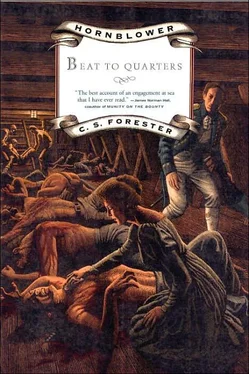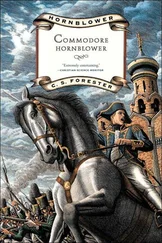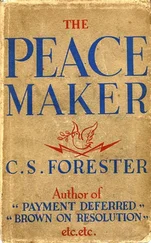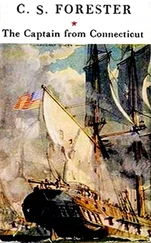“Your excellency will forgive me, but in this country we have only maize. There is a little wheat grown in the tierra templeda, but it rests still in the hands of the unenlightened. Would maize flour suffice?”
Hernandez’ face was working with anxiety as he gazed at Hornblower. It was only then that Hornblower realised than Hernandez was in terror of his life, and that el Supremo’s lighthearted endorsement of the requisitions he had made was far more potent than any stamped and sealed order addressed to a Spanish official.
“This is very serious,” said Hornblower sternly. “My English sailors are unaccustomed to maize flour.”
“I know that,” said Hernandez, his interlocked fingers working galvanically. “But I assure your excellency that I can only obtain wheat flour for them by fighting for it, and I know that el Supremo would not like me to fight at present. El Supremo will be angry.”
Hornblower remembered the abject fright with which Hernandez had regarded el Supremo the night before. The man was in terror lest he should be denounced as having failed to execute his orders. And then, suddenly, Hornblower remembered something he had unaccountably forgotten to ask for—something more important, if possible, than tobacco or fruit, and certainly far more important than the difference between maize flour and wheat.
“Very well,” he said. “I will agree to use maize flour. But in consequence of this deficiency there is something else I must ask for.”
“Certainly, Captain. I will supply whatever you ask. You have only to name it.”
“I want drink for my men,” said Hornblower. “Is there wine to be had here? Ardent spirits?”
“There is a little wine, your excellency. Only a little. The people on this coast drink an ardent spirit with which you are perhaps not acquainted. It is good when of good quality. It is distilled from the waste of the sugar mills, from the treacle, your excellency.”
“Rum, by God!” exclaimed Hornblower.
“Yes, señor, rum. Would that be of any use to your excellency?”
“I shall accept it in lieu of anything better,” said Hornblower sternly.
His heart was leaping with joy. It would appear like a miracle to his officers that he should conjure rum and tobacco from this volcano-riddled coast.
“Thank you, Captain. And shall we begin to slaughter the cattle now?”
That was the question on which Hornblower had been postponing a decision ever since he had heard about the arrival of the cattle on the beach. Hornblower looked up at the lookout at the masthead. He tested the strength of the wind. He gazed out to sea before he took the plunge.
“Very well,” he said at length. “We will start now.”
The sea breeze was not nearly as strong as yesterday, and the weaker the breeze the less chance there was of the Natividad coming in to interrupt the Lydia ’s revictualling. And as events turned out the Lydia completed the work undisturbed. For two days the boats plied back and forth between the beach and the ship. They came back piled high with bloody joints of meat; the sand of the shore ran red with the blood of the slaughtered animals, while the halftame vultures gorged themselves into a coma in the piled offal. On board the ship the purser and his crew toiled like slaves in the roasting heat, cramming the brine barrels with the meat and tugging them into position in the storerooms. The cooper and his mates worked for two days with hardly a break, making and repairing casks. Sacks of flour, ankers of rum, bales of tobacco—the hands at the tackles sweated as they swayed these up from the boats. The Lydia was gorging herself full.
So obvious were the good intentions of those on shore that Hornblower was able to give orders that the cargo consigned to this coast should be released, and so the boats which bore the meat and flour to the ship returned laden with cases of muskets and kegs of powder and shot. Hornblower had his gig hoisted out, and was rowed periodically round his ship inspecting her trim, in the anticipation lest at any moment he would have to hoist up his anchor and beat out to sea to fight the Natividad .
The work proceeded by night as well as by day; in fifteen years at sea—every one a year of warfare—Hornblower had seen many opportunities lost as a result of some trivial lack of energy, some omission to drive a crew into exerting the last ounce of its strength. He had lost opportunities himself like that, for that matter. He still felt a revulsion of shame at the recollection of how he had missed that privateer off the Azores, for example. For fear of standing condemned again in his own eyes he drove his men until they dropped.
There was no time for enjoyment of the pleasures of land at the moment. The shore party did indeed cook their rations before a huge bonfire, and revel in roast fresh meat after seven months of boiled salt meat, but with the characteristic contrariness of British sailors they turned with revulsion from the delicious fruit which was offered them—bananas and pawpaws, pineapples and guavas, and considered themselves the victims of sharp practice because these were substituted for their regulation ration of boiled dried peas.
And then, on the second evening, as Hornblower walked the quarterdeck enjoying the sea breeze at its freshest, and rebelling in the thought that he was free of the land if necessary for another six months, and looking forward with the sheerest joy to his imminent dinner of roast fowl, there came the sound of firing from the beach A scattering volley at first; a few dropping shots, and then another ragged volley. Hornblower forgot his dinner, his feeling of wellbeing, everything. Trouble on the mainland, of whatever sort, meant that the success of his mission was being imperilled. In hot haste he called for his gig, and he was pulled to the shore by a crew who made the stout oars bend as they flung their weight on the handles in response to the profane urgings of Coxswain Brown.
The scene that greeted his eyes as he rounded the point excited his worst apprehensions. The whole landing party was clubbed together on the beach; the dozen marines were in line on one flank, reloading their muskets; the sailors were bunched beside them armed with whatever weapons had come to their hands. In a wide semicircle round them were the inhabitants, brandishing swords and muskets, and in the no man’s land between the two parties lay one or two corpses. At the water’s edge, behind the sailors, lay one of the hands with two of his mates bending over him. He was propped up on his elbow and he was vomiting floods of blood.
Hornblower sprang into the shallows; he paid no attention to the wounded sailor, but pushed his way through the mob before him. As he emerged into the open there came a puff of smoke from the half circle up the beach and a bullet sang over his head. He paid no attention to that either.
“Put those muskets down!” he roared at the marines, and he turned towards the gesticulating inhabitants and held up his hand palm forward, in the universal and instinctive gesture of peace. There was no room in his mind for thought of personal danger, so hot was he with anger at the thought that someone was botching his chance of success.
“What’s the meaning of this?” he demanded.
Galbraith was in command. He was about to speak, but he was given no opportunity. One of the sailors who had been attending to the dying man came pushing forward, discipline forgotten in the blind whirl of sentimental indignation which Hornblower instantly recognized as characteristic of the lower deck—and which he despised and distrusted.
“They been torturing a pore devil up there, sir,” he said. “Lashed him to a spar and left him to die of thirst.”
Читать дальше












